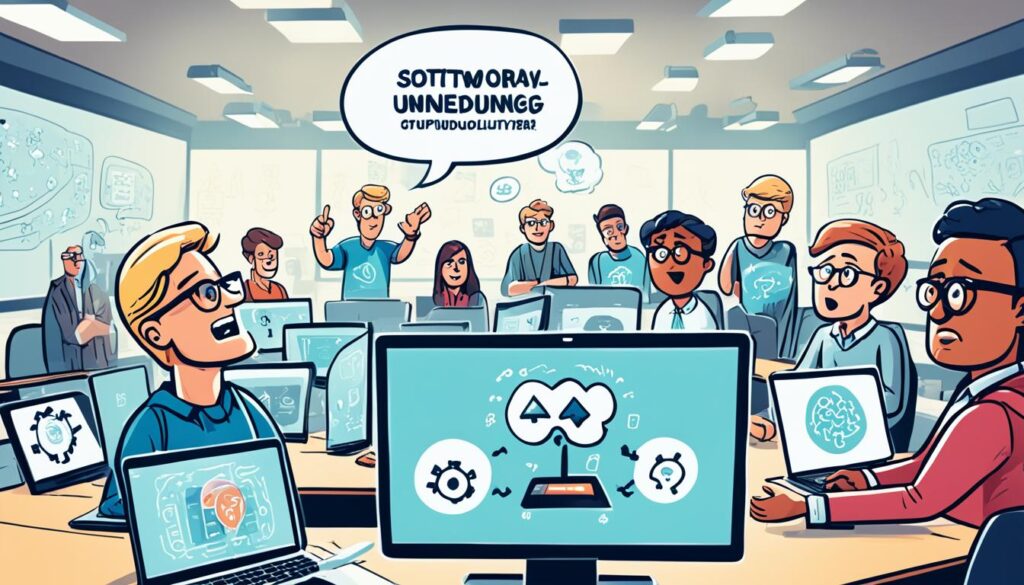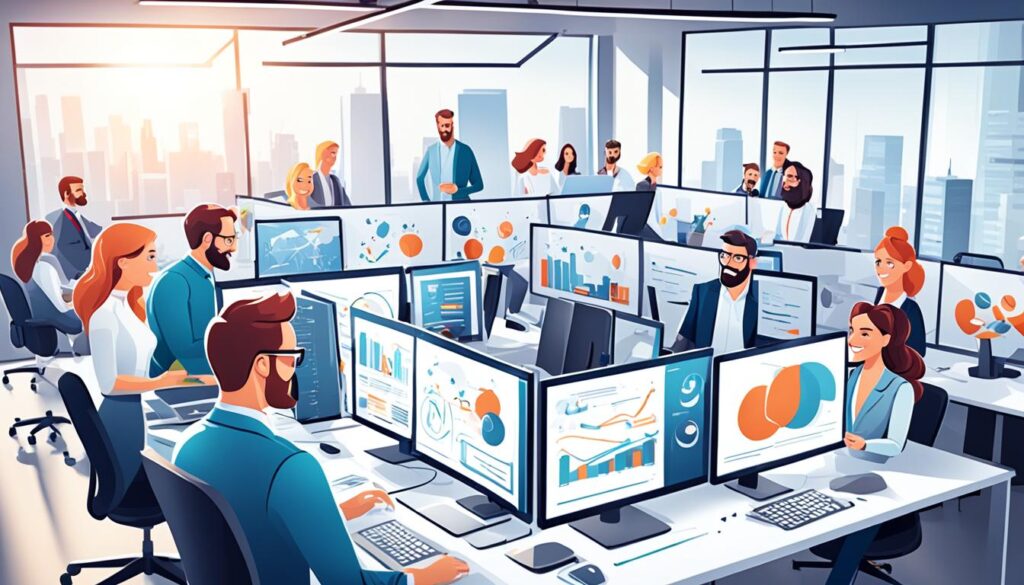The Future of Work: Embracing AI
As AI transforms the workplace, it’s natural to wonder what the future holds. While some may fear AI’s impact, it also brings unprecedented opportunities. AI platforms and tools are revolutionizing job searches, skill-building, and career exploration. Whether you’re a seasoned professional or just starting out, AI can help you stay ahead in your field.
AI for All: Debunking the Age Myth
Contrary to popular belief, AI isn’t just for the young. It’s designed to enhance the skills of professionals at all levels, providing personalized guidance and support. By embracing AI, you can overcome fears and unlock new career possibilities. Let’s explore the tools and resources available to you, especially if you’re a mid-career professional looking to navigate the tech landscape. Discover how AI can transform your career trajectory.
Understanding the Impact of AI on the Labor Market
Understanding the Impact of AI on the Labor Market
Advanced technologies like artificial intelligence (AI) are quickly changing jobs in many fields. This significant shift is making some tasks automated, requiring us to rethink how we grow our careers. Knowing how to work with human-AI collaboration is key for success now. As AI takes over routine and repetitive tasks, it’s essential to develop skills that complement AI capabilities.
The Changing Nature of Work
Work is changing because of AI. Jobs are becoming more flexible, pushing us to keep learning and adapting to new technologies. The skills that used to get us jobs aren’t enough anymore. We now have to use new digital AI tools that make work easier, allow for new ideas, and enhance our productivity. Besides technical skills, being able to work with AI is crucial. This aspect shows jobs are not only about doing tasks quickly but also about being creative with technology and finding innovative solutions.
The Need for Occupational Transitions
Today’s economy, driven by rapid tech progress, highlights the need for workforce development. We should be ready for job changes that are coming. Future jobs will mix human insight and AI’s data handling, requiring a new set of skills. This change means learning new skills is critical to stay relevant and employed. AI-powered online courses are a great help, offering personalized learning to meet the job market’s changing needs and helping you succeed in your career. To thrive in this new landscape, it’s essential to be proactive and open to learning new skills, and to be prepared for the future of work.
The Future of Human-AI Collaboration
AI is no longer just a buzzword; it’s a reality that’s transforming our work environments. Instead of replacing humans, AI is enhancing our productivity and skills. Imagine a workplace where tasks are opportunities to boost your efficiency and expertise. AI is augmenting our abilities, allowing us to focus on high-value tasks that require creativity, empathy, and critical thinking.
Streamlining Work with AI Tools
AI can revolutionize your workday by automating tedious tasks and freeing up your time for more strategic thinking. With AI, hours of work can be reduced to mere minutes, allowing you to focus on high-value tasks. By teaming up with AI, your knowledge and expertise can improve AI’s abilities, creating a powerful human-AI synergy. This synergy enables you to tackle complex problems, make data-driven decisions, and drive innovation.
Unlocking Career Advantages
This collaboration creates a balanced human-AI dynamic, offering numerous career benefits. By embracing AI-driven workspaces, you can develop new skills and expertise, stay ahead in innovation, enhance your productivity and efficiency, and open up new areas of growth and learning. You’ll be able to take on new challenges, lead projects, and make a meaningful impact in your organization. The future of work is not about humans vs. AI, but about humans and AI working together to achieve greatness.
AI Transforming Industries
AI is revolutionizing the work landscape, transforming industries like healthcare, education, and agriculture. This shift is driving innovation and efficiency, and it’s more than just a trend. AI is bringing about a paradigm shift in the way industries operate, making them more efficient, productive, and customer-centric.
Healthcare: Personalized Patient Care
AI is transforming healthcare by providing accurate diagnoses and personalized treatment plans. By leveraging algorithms and data management, healthcare providers can make informed decisions, improving patient outcomes and quality of life. AI-powered systems can analyze vast amounts of medical data, identify patterns, and provide insights that doctors and nurses may miss. This enables healthcare professionals to provide personalized care, tailor-made to individual patients’ needs, leading to better health outcomes and improved patient satisfaction.
Education: Dynamic Learning
AI is making learning more dynamic, creating custom learning paths and helping teachers track progress. By automating administrative tasks, teachers can focus on creating engaging learning environments, improving student outcomes. AI-powered adaptive learning systems adjust the difficulty level of course materials based on a student’s performance, providing an optimal learning experience. Additionally, AI-driven analytics help teachers identify areas where students need extra support, enabling targeted interventions and improved academic achievement.
Call Centers: Enhanced Customer Experience
AI is revolutionizing call centers with chatbots and virtual assistants, providing faster and more empathetic customer service. This integration improves customer satisfaction and provides businesses with valuable insights. AI-powered chatbots can handle routine customer inquiries, freeing up human customer support agents to focus on complex issues and emotional intelligence. Moreover, AI-driven sentiment analysis helps businesses understand customer preferences and concerns, enabling data-driven decision-making and enhanced customer experience.
Agriculture: Sustainable Farming
AI is enhancing farming with automation, using drones and analytics to monitor crops and manage resources efficiently. This approach supports sustainable farming, ensuring food security and promoting environmental stewardship. AI can automate farming tasks, such as crop monitoring and resource management, making farming more efficient and reducing waste.
AI-powered drones can monitor crops and detect issues such as pests, diseases, and nutrient deficiencies, allowing for early intervention and reducing the use of chemicals. AI can analyze data from various sources, such as weather stations, soil sensors, and crop yields, to provide insights on optimal farming practices, reducing waste and improving productivity.
Staying Ahead in a Changing World
Understanding AI’s impact on various sectors can help you stay up-to-date and open up new opportunities for growth and career progression in an increasingly automated world. As AI continues to transform industries, it’s essential to stay informed and adapt to the changing landscape. By embracing AI and its potential, you can future-proof your career and contribute to the development of innovative solutions that improve lives and drive progress.
AI in Military and Warfare
Today’s armies are blending high-tech tools with their forces, making overcoming technophobia key. The battlefield is evolving due to military AI advancements. This affects defense strategies worldwide. You need to grasp AI’s defense roles to see its benefits and risks.

Opportunities and Challenges
AI and military power together bring new skills to the table. AI boosts surveillance, strategy, and fast data processing. This combo gives your country’s defense stronger readiness and smarter tactics.
But, using AI in battle comes with big issues. Ethical concerns are growing as AI moves faster than our laws. Questions about autonomous weapons spark discussion on control and human decision-making in war. Clear rules are a must for AI to aid in warfare positively.
If you’re into tech, strategy, or ethical warfare, you’ll find AI’s impact on military matters significant. As AI grows, staying open and informed helps steer its use towards protecting both safety and moral values.
The Future of Work in Healthcare
Artificial intelligence (AI) is revolutionizing healthcare, improving patient care and transforming the jobs of healthcare professionals.
Benefits of AI in Healthcare
AI has brought numerous benefits to healthcare, including:
- Accurate diagnoses: AI systems like IBM’s Watson for Health analyze vast amounts of data to help doctors make precise diagnoses and personalized treatment plans.
- Streamlined workflows: AI-powered tools like automated speech recognition and natural language processing help reduce paperwork, freeing up medical staff to focus on patient care.
- Enhanced patient engagement: AI-driven chatbots like Woebot and Wysa offer personalized support and mental health resources to patients, improving their overall experience.
Successful Implementations
- University of California, San Francisco (UCSF): Implemented AI-powered algorithms to predict patient risk and improve sepsis detection, resulting in a 25% reduction in sepsis cases.
- Medtronic: Developed an AI-powered sugar.ie app to help diabetes patients manage their condition, resulting in a 20% reduction in hospitalizations.
Challenges and Considerations
While AI brings many benefits, it also raises important challenges and considerations, including:
- Ensuring fairness and equity: AI systems must be designed to avoid bias and ensure equal access to care for all patients.
- Protecting patient data: AI systems must prioritize patient data privacy and security to maintain trust and confidentiality.
- Balancing human touch with technology: Healthcare workers must stay informed and use AI wisely, without losing the empathy and human connection essential for quality patient care.
The Future of Work in Education
AI is transforming education, revolutionizing how we learn and teach. This shift is backed by research, with a study by the National Center for Education Statistics finding that 70% of educators believe AI will have a positive impact on education. (Look at the AI generated words in the thought bubble).

Personalized Learning with AI
AI revolutionizes the education landscape by enabling personalized learning paths for each student, carefully tailored to their unique needs, learning styles, and pace. This innovative approach has been proven to significantly increase student engagement and improve academic outcomes.
By harnessing the power of AI, teachers can create customized learning experiences that cater to the individual strengths and weaknesses of each student, fostering a more inclusive and effective learning environment. Additionally, AI automates administrative tasks such as grading, freeing teachers to focus on what they do best – teaching, mentoring, and inspiring their students. With AI, education becomes more student-centric, adaptive, and impactful, preparing the next generation for success in an ever-changing world.
Enhancing Teaching with AI
AI promotes interactive learning, preparing students for the digital world. It opens new doors for how students engage with information, and research by the International Society for Technology in Education found that AI-powered learning tools can increase student motivation and self-directed learning. AI systems can help tailor learning content based on student-specific learning patterns or knowledge levels, enabling personalized learning experiences.
AI can also automate instructors’ routine tasks such as grading and answering simple, repetitive questions in online discussion forums, freeing up instructors’ time to focus on more complex and creative tasks. Additionally, AI can power adaptive assessments and help instructors understand students’ performance, progress, and potential by decrypting their clickstream data.
Furthermore, AI can help create immersive virtual environments that allow several physically separated users to collaborate, and improve instructors’ presence as a coach in technology-mediated learning environments. By harnessing the power of AI, educators can create more effective, engaging, and inclusive learning experiences for their students.
Balancing Human Touch with Technology
While AI brings many benefits, it’s essential to ensure it enhances teaching without replacing the human touch of teachers. A balanced approach is crucial, as technology should augment, rather than supplant, the expertise and empathy of educators. AI can handle administrative tasks, provide personalized learning pathways, and offer real-time feedback, but it cannot replicate the emotional intelligence, creativity, and critical thinking that teachers bring to the classroom.
Moreover, educators must be aware of potential biases in AI systems, which can perpetuate existing inequalities if left unchecked. By being mindful of these biases and actively working to address them, we can ensure fairness in education and create a harmonious blend of human touch and technological innovation. This balanced approach will enable us to harness the strengths of both, providing students with a comprehensive and inclusive learning experience.
Preparing for an AI-Integrated Office Environment
Offices are changing because of artificial intelligence. Getting ready for this change is critical. It’s about learning new skills and finding ways to get better at your job. By adapting to these tech changes, you stay important and improve your skills in a world that’s more and more driven by AI. This requires a willingness to learn and adapt, as well as an openness to new technologies and processes.
Workforce Development and Upskilling
Investing in workforce development is key to keeping ahead in an AI-driven world. By taking upskilling opportunities, you can learn new skills and stay relevant in a rapidly changing job market. This not only boosts your confidence but also enables you to face an automated world with confidence. Continuous learning helps you handle any fear of technology and move smoothly into new jobs that work with AI.
Upskilling opportunities can include training programs, workshops, and online courses that focus on emerging technologies like AI, data science, and cloud computing. By investing in your own development, you can stay ahead of the curve and remain competitive in a job market that is increasingly dependent on technology. Additionally, upskilling can help you transition into new roles and industries, and can even lead to new career opportunities and advancement. By embracing lifelong learning and upskilling, you can future-proof your career and thrive in an AI-driven world.
Balancing Automation and Human Interaction
Finding the right mix in an AI-enhanced office is vital. It’s about using both human and machine strengths to create a harmonious and productive work environment. By leveraging the capabilities of both, you can complement automation with human judgment and emotional intelligence. This balance allows you to capitalize on the efficiency and accuracy of AI while maintaining the creativity, empathy, and critical thinking that are unique to humans.
By striking the right balance, you can harness the power of AI to augment and enhance your work, rather than replacing it. This synergy enables you to work smarter, faster, and more effectively, while also preserving the human touch that is essential for building strong relationships and driving business success.
Fostering a Culture of Collaboration
It’s important to understand how humans and AI can work together in harmony, each contributing their unique strengths and abilities to achieve common goals. Creating a work environment that encourages teamwork with technology is crucial for success in today’s fast-paced, tech-driven world. By fostering a culture of collaboration, you can bring together the creativity, empathy, and problem-solving skills of humans with the speed, accuracy, and scalability of AI.
This fusion of human and machine capabilities enables your workplace to stand out as a hub of innovation, productivity, and dynamic interactions, where employees and AI systems work together seamlessly to drive business growth and success. By embracing this collaborative approach, you can unlock new possibilities, drive digital transformation, and stay ahead of the competition.
Resources for Navigating the AI-Integrated Workplace
Starting your journey in an AI-integrated workplace can be exciting and a bit scary, especially if you’re not so young. If tech makes you nervous, know there are many tools out there for you. These tools are made to help middle-aged folks get comfortable with AI. They show you every step, making tech a helpful friend, not a foe.
AI Apps and Websites for Over-40s
Overcoming your fear of tech starts with finding the right AI tools. Here are some user-friendly options designed for people over 40:
- Coursera: An online learning platform offering AI courses from top universities like Stanford and MIT.
- Udemy: A popular platform for learning AI skills, with courses tailored for beginners.
- IBM Watson Studio: A cloud-based platform for building and deploying AI models, with tutorials and guides for beginners.
- Google AI Platform: A suite of AI tools and services, including machine learning and natural language processing.
- AI for Everyone: A website offering tutorials, videos, and step-by-step guides on AI basics and applications.
These resources empower you to learn at your own pace, building confidence and skills. By using these tools, you’ll not only understand AI but also learn how to apply it in your job, equipping you for success in a tech-focused world. Embrace this change and discover new career opportunities!
Legal Disclaimer for AIover40.com
Welcome to AIover40.com. Please note that the information provided on our blog, including comments and insights, is intended for informational and entertainment purposes only. This blog is not a source of professional advice.
No Professional Advice
The content shared on this blog is designed to provide helpful information on the topics discussed. However, this blog does not provide professional advice and should not be used as a substitute for advice from a certified professional in the fields of artificial intelligence, finance, healthcare, or any other professional domain. The use of any information provided on this blog is solely at your own risk.
Accuracy and Completeness
While we strive to keep the information up to date and correct, we make no representations or warranties of any kind, express or implied, about the completeness, accuracy, reliability, suitability, or availability of the website or the information, products, services, or related graphics found on the website for any purpose.
Limitation of Liability
In no event will AIover40.com, its affiliates or its representatives be liable for any loss or damage including without limitation, indirect or consequential loss or damage, or any loss or damage whatsoever arising from loss of data or profits arising out of, or in connection with, the use of this blog.
Consent
By using our blog, you hereby consent to our disclaimer and agree to its terms.
